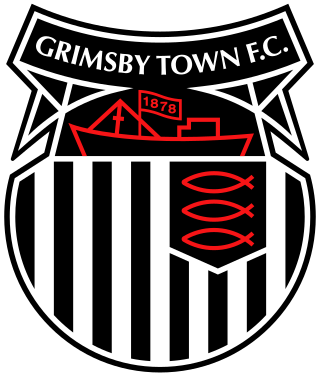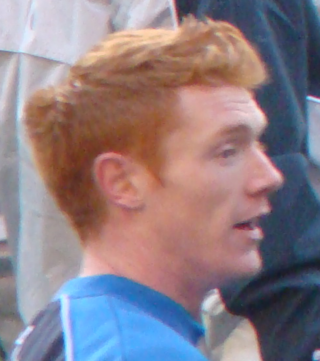Related Research Articles

Tranmere Rovers Football Club is a professional association football club based in Birkenhead, Merseyside, England. The team competes in EFL League Two, the fourth level of the English football league system.

Cambridge United Football Club is a professional association football club based in the city of Cambridge, England. They compete in EFL League One, the third level of the English football league system.

Newport County AFC is a professional association football club in the city of Newport, South Wales. The team compete in EFL League Two, the fourth level of the English football league system. The club's usual home colours are amber shirts and black shorts.

Grimsby Town Football Club is a professional association football club based in Cleethorpes, North East Lincolnshire, England, that competes in EFL League Two, the fourth level of the English football league system.

Stevenage Football Club is a professional association football club based in the town of Stevenage, Hertfordshire, England. The club competes in EFL League One, the third level of the English football league system. They play their home games at The Lamex Stadium in Stevenage.

David Barry Kitson is an English former professional footballer who played as a forward.

Gary Stephen Johnson is a former football player who is currently the Director of Football at Cheltenham Town.

Richard Money is an English former footballer and manager who was most recently manager of National League club Hartlepool United. Before this, he managed Cambridge United, overseeing the side's return to the Football League after a nine-year absence. Money was dismissed by Cambridge in November 2015.
Andrew John Parkinson is an English former professional footballer and youth team manager of Tranmere Rovers.

Tunbridge Wells Football Club is a football club based in Royal Tunbridge Wells, Kent, England. They are currently members of the Southern Counties East League Premier Division. They play their home games at Culverden Stadium. The club is affiliated to the Kent County Football Association.

North Greenford United Football Club is a football club based in Greenford in the London Borough of Ealing, England. They play in the Combined Counties League Premier Division North. The club is affiliated to the Middlesex County Football Association.
Paul Kitson is an English former professional footballer who played as a striker.
George Edward Pilkington is an English former professional footballer. During his playing career, he was a defender. He made 647 league and cup appearances across a 16-year professional career in the English Football League and National League.

Daniel Stephen Crow is an English former footballer who played as a striker.
Peter Harry Winn is an English semi-professional footballer who plays for Barton Town. He started his career at Scunthorpe United, making his first-team debut at the age of 16 whilst a second-year scholar. He was loaned out to Northwich Victoria and Barrow respectively towards the latter stages of the 2008–09 season. Winn joined Conference Premier club Gateshead the following season, initially on a two-month loan deal, before extending the agreement until the end of the season.
Robbie Simpson is an English former professional footballer who played as a forward. Simpson is currently manager at National League South club Chelmsford City.
Kevin Roberts is an English professional footballer who plays as a defender for National League North club Chester.
Ryan Mark Donaldson is an English professional footballer who plays as a midfielder.
The 2010–11 season was the 98th full season in the history of Cambridge United. They competed in the Conference National, finishing 17th of 24, along with various cup competitions.
Robbie James Willmott is an English footballer who plays as a winger or midfielder for Cymru Premier club Barry Town United.
References
- ↑ "Dion Dublin hails Cambridge's 'heart and soul' Jez George". BBC Sport. 9 June 2011. Retrieved 11 December 2011.
- 1 2 3 "PFF Launch Walk for Change". Cambridge United. 14 April 2010. Archived from the original on 18 December 2010. Retrieved 11 December 2011.
- ↑ "Arsenal legend Bob Wilson backs Protect Football's Future campaign". Cambridge First. 5 October 2010. Archived from the original on 6 April 2012. Retrieved 11 December 2011.
- ↑ "Ferguson, Robinson & Kitson Support PFF". Cambridge United. 5 March 2010. Archived from the original on 1 August 2012. Retrieved 11 December 2011.
- ↑ "CAMBRIDGE UNITED YOUTH AND COMMUNITY TRUST". Charity Commission Entry. Charities Commission. Archived from the original on 4 March 2016. Retrieved 12 November 2011.
- ↑ "Cambridge United Youth & Community Trust". Cambridge United Youth & Community Trust. Archived from the original on 5 March 2012. Retrieved 12 November 2011.
- 1 2 "Protect Football's Future - About Us". Protect Football's Future. Archived from the original on 28 April 2010. Retrieved 12 November 2011.
- ↑ "Centre of Excellence". Cambridge United. Archived from the original on 13 March 2012. Retrieved 12 November 2011.
- ↑ "The future price of failure". When Saturday Comes. 5 January 2010. Retrieved 11 December 2011.
- ↑ "George heading Wembley way". Cambridge News . 27 March 2010. Retrieved 11 December 2011.
- ↑ "Walk for Change - Wrexham to Wembley". Cambridge United. 26 February 2010. Archived from the original on 1 March 2010. Retrieved 11 December 2011.
- 1 2 "York City's youth stance praised by Jez George". The Press . 29 January 2011. Retrieved 11 December 2011.
- ↑ "Stoke's Dave Kitson leads call for non-league youth investment". The Guardian . 27 May 2010. Retrieved 11 December 2011.
- ↑ "Reserve Preview". Cambridge United. 10 August 2006. Retrieved 13 November 2011.[ permanent dead link ]
- ↑ "Luke Berry - Player Profile". Cambridge United. Archived from the original on 14 November 2011. Retrieved 13 November 2011.
- ↑ "Josh Coulson - Player Profile". Cambridge United. Archived from the original on 2 November 2011. Retrieved 13 November 2011.
- ↑ "Ling and Schofield Depart". Cambridge United. 1 February 2009. Archived from the original on 3 February 2011. Retrieved 2 February 2011.
- 1 2 "Jez George appointed caretaker manager". Cambridge United F.C. 2 February 2009. Archived from the original on 5 February 2011. Retrieved 2 February 2011.
- ↑ "Jez George appointed Cambridge United manager". BBC. 5 May 2011. Retrieved 5 May 2011.
- 1 2 "Drop your pay or you won't play, says Jez". Cambridge News . 21 June 2011. Archived from the original on 17 August 2011. Retrieved 13 November 2011.
- ↑ "Cambridge United fixtures and results 2011/12 season". Cambridge United. Archived from the original on 13 November 2011. Retrieved 13 November 2011.
- ↑ "CONFERENCE 2011/12 PREVIEW". BetTrends. 8 May 2011. Archived from the original on 25 April 2012. Retrieved 13 November 2011.
- ↑ "Cambridge United's empty trophy cabinet eBay auction bids top £2m". Metro. 2 November 2011. Retrieved 13 November 2011.
- ↑ "Viva La Jezolution!". Cambridge United. 25 August 2011. Archived from the original on 1 August 2012. Retrieved 13 November 2011.
- ↑ "Cambridge United boss Jez George pays for fans' tickets". BBC Sport. 17 April 2012. Retrieved 17 April 2012.
- ↑ "RICHARD MONEY JOINS AS HEAD COACH". Cambridge United F.C. 4 October 2012. Archived from the original on 7 October 2012. Retrieved 4 October 2012.
- ↑ "Managers: Jez George". Soccerbase. Centurycomm. Retrieved 24 March 2017.